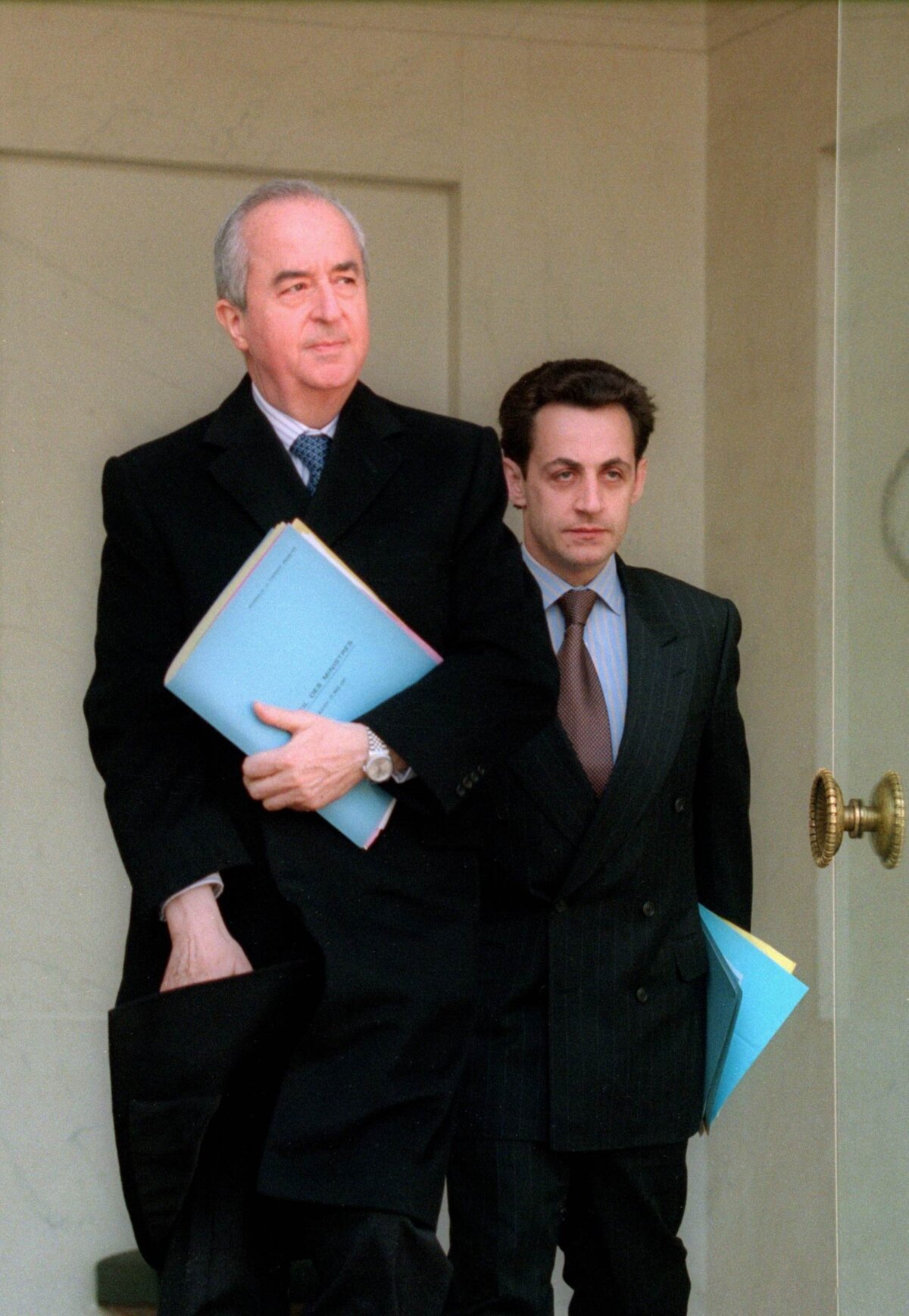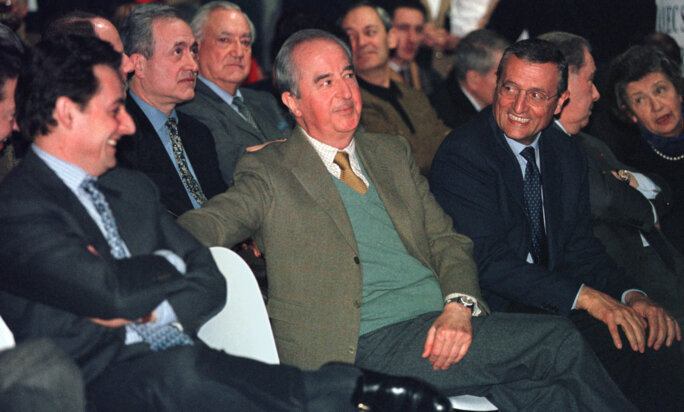A senior French civil servant has told a corruption investigation that former president Nicolas Sarkozy personally authorized the payment of secret commission payments from French armament contracts which are suspected of being used to illegally finance political activity.
Mediapart can reveal that Patricia Laplaud, a former budget ministry financial supervisor of armaments sales gave a statement to the investigation led by two Paris-based judges in which she says that Sarkozy, when budget minister in 1994, ordered the secret cash transfers despite opposition from his ministerial advisors.
The claim is a major development in what has become known in France as ‘The Karachi Affair’ (click here for Q&A guide), and which centres on mounting evidence that Sarkozy’s political mentor, former prime minister Edouard Balladur, illegally funded his 1995 presidential election bid by siphoning off money from several armaments deals hurriedly organized by his government in 1994.

Enlargement : Illustration 1

The judicial investigation was launched in 2010, in parallel to a separate judicial investigation into the deaths of 11 French naval engineers who died in a bomb attack in Karachi while working on one of the contracts, for the sale of three French Agosta-class submarines to Pakistan.
The 2002 attack is speculated to have been retaliation for the cancelling of slush payments to Pakistani intermediaries by Balladur’s political rival and victor, former French President Jacques Chirac. After beating Balladur in the 1995 elections, Chirac ordered an end to all commission payments in the dubious arms deals, allegedly to starve his rival of funding.
Sarkozy was Balladur’s presidential election campaign spokesman and served as his budget minister when the weapons contracts now under investigation were signed. Importantly, a key suspect in the case, Franco Lebanese arms broker Ziad Takieddine, continued to act as a go-between in arms deals mounted by Sarkozy’s closest advisors with several Arab states, beginning after he returned to government as a minister in 2002 and continuing after he became president in 2007.
Judges Renaud Van Ruymbeke and Roger Le Loire, leading the probe, have placed Takieddine under formal investigation – a French legal move one step short of charges being brought – on three counts relating to corruption and embezzlement. Others placed under investigation include two of Sarkozy’s friends and former ministerial advisors, Thierry Gaubert and Nicolas Bazire (who was treasurer of Balladur’s presidential campaign).
Sarkozy has consistently dismissed allegations that he helped organize the illegal funding of Balladur’s presidential bid, and the latter has also denied the charge. But the statement offered by Patricia Laplaud, who is still employed as a senior civil servant, implicates Sarkozy in the hurried establishment of the commission payments, which Takieddine withdrew from secret Swiss bank accounts in cash.
The armaments deals studied by Van Ruymbeke and Le Loire concern the Agosta submarine contract with Pakistan (worth 825 million euros), and two separate contracts with Saudi Arabia – one for the sale of three La Fayette-class French frigates (worth 2.8 billion euros), codenamed Sawari 2, and the other, codenamed Mouette (worth 503 million euros), for the careening and maintenance of three frigates sold by France to the Saudis in the 1980s along with two oil tankers.
Laplaud has stated that Sarkozy, the minister to whom she was responsible, adopted an official position that was “unfaourable” to the Agosta contract. She has also said that she had no knowledge of Sarkozy’s alleged involvement in establishing a Luxembourg-based company, called Heine, for the secret passage of the commission payments.
But questioned on July 3rd by police acting under judges Van Ruymbeke and Le Loire, she revealed that Sarkozy, who served as Balladur’s budget minister from 1993 to 1995, overrode his ministerial staff’s doubts over the validity of the payment of commissions for the Mouette maintenance contract.
In her statement, to which Medipart has gained access, Laplaud said that she considered the amount to be paid in secret commissions for the Mouette deal was “a financial risk” for the contract, and therefore she sought written authorization for the payments from a senior source, notably to protect the responsibility of the defence ministry’s financial controller.
Describing the secret commissions by the French slang term ‘balourd’, she said: “Because of the balourd and the size of the contract, we needed a written agreement from our minister [Editor’s note: Nicolas Sarkozy], which we obtained. The Mouette contract was a sizeable contract. A note was sent to the minister’s cabinet in order to obtain this agreement.”
A contract that cost France 1.1 billion francs
Her statement is supported by a document written by a former director of the French national arms export sales agency Sofresa, José Barbero, and which is held as evidence by Judge Van Ruymbeke. In January 1995, Barbero noted that “Madame Laplaud made very strong comments about the [secret commission payments] that she only accepted, she says, with the agreement of her minister.”
Laplaud said she believed a copy of the agreement signed by Sarkozy could still be found in ministerial archives. “The Ministry of Defence’s [financial] controller has no doubt kept a copy,” she said in her statement.
The value of Mouette contract totaled 3.3 billion francs (503 million euros), while the commission payments, destined for Ziad Takieddine’s network of intermediaries, totaled 210 million francs (31.5 million euros). Just under a third of these, 80 million francs, was to be paid before the first round of the 1995 French presidential elections, in which Balladur was running against Chirac as a rival conservative candidate.
Concerning the swiftness of the initial payment, Laplaud said in her statement: “The explanation that was given to me was that the beneficiaries wanted to have their money very quickly.”
The investigation by Van Ruymbeke and Le Loire has already established that in June 1994, just four months after the signature of the contract, commission payments had been withdrawn in cash by Ziad Takieddine from the Geneva bank account of his business associate Abdul Rahman El Assir.
El Assir, who was placed under investigation by Van Ruymbeke on May 30th, has previously confirmed that he had established a financial system by which Takieddine could receive hidden payments.
“Ziad Takieddine wanted this confidentiality because he feared the French customs and surveillance by Swiss banks,” El Assir said in a statement.

Enlargement : Illustration 2

Van Ruymbeke’s investigation has so far established that Takieddine made cash withdrawls of a total 71.7 million francs (about 10.6 million euros) from accounts into which commissions paid by the French state had been funnelled. These commissions concerned the Agosta submarine contract with Pakistan and the Mouette and Sawari 2 contracts with Saudi Arabia. The payments were made by the Sofresa, the French national weapons export agency, and the state-owned DCN military shipbuilding company, responsible for building the Agosta-class submarines and La Fayette-class frigates.
“Industrial mistakes were directly covered by the state budget. That is why I looked very closely at the manner in which the state could be engaged,” Laplaud told police in her July statement. “I looked at the industrial consequences and the financial consequences [..] Agosta and Mouette had losses right up to the end of the contract.”
In a document dated March 1st 1995, the then head of the French budget ministry’s senior public accounts department, Isabelle Bouillot, wrote directly to Nicolas Sarkozy to warn him of the excessive costs to France of the Mouette contract signed with Saudi Arabia. The document, also held as evidence in Judge Van Ruymbeke’s investigation, read: “Up until 1994, all the contracts signed with Saudi Arabia were supra-financed. The first counter example was the Mouette contract, one that caused a whole series of difficulties and derogations in setting up. Concerning Mouette, the under-financing came exclusively from the payment of [commissions] at the beginning of the contract.”
The series of “difficulties and derogations” included the need, for the first time ever, for the French government to apply for an onerous bank loan to finance the payment of commissions before the Saudi’s had themselves begun making payment for the weapons sale.
Indeed, in October 1997, a report drawn up by the then socialist Prime Minister Lionel Jospin sharply criticized the rushed management of the deal. It notably slammed “the desire of the Ministry of Defence to conclude this contract ‘at any price’, which led the DCN to offer the client a price that was 500 million francs less than the estimate it had [originally] established.”
In 1998, a study by the French defence ministry’s General Directorate for Armament, the direction générale de l’armement, concluded that the losses to the state incurred by the Mouette contract came to a total 1.1 billion francs.
-------------------------
For more on the background to the issues raised in this article and Mediapart's exclusive investigations into the political scandal surrounding the activities of arms dealer Ziad Takieddine, click on the links below:
Mediapart lawyers call for key Sarkozy-Gaddafi election payment witness to be heard by French judge
French government stalls Interpol call for arrest of Gaddafi funding chief
Sarkozy attacks Mediapart over Gaddafi funding revelations
Gaddafi funding of Sarkozy election campaign: the proof
Exclusive: secret report describes Gaddafi funding of Sarkozy's 2007 election campaig
French IT group Bull horned by Libyan internet espionage deal
French judge finds key evidence in illegal funding probe
Net closes in on French presidency after funding 'scam' arrests
Arms dealer probe brings illegal funding scandal closer to Sarkozy
The secret financier who brings danger to the Sarkozy clan
Sarkozy, the arms dealer, and a secret 350 million-euro commission
Exclusive: how Sarkozy's team sought grace for Gaddafi's murderous henchman
Exlusive: how President Sarkozy's team dealt with Gaddafi
When Total paid the bill for the Elysée's secret emissary
The French-built stealth offroader that may be hiding Gaddafi
-------------------------
English version: Graham Tearse


